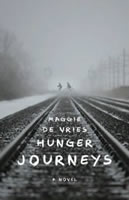|
|
||||||||
 |
||||||||
|
Home >> Books for Teens
>> Hunger Journeys |
||||||||
|
Hunger Journeys It’s World War Two in Amsterdam. Teenaged Lena leaves her starving family to travel by train with her friend, Sofie, to Almelo, a town close to the German border. It’s a risky plan. They have false papers and are quickly pulled off the train by German soldiers. Only by fluke do they get back on again -- with the help of Albert, one of the other soldiers. After Lena discovers that the train had also been used to transport Jews to concentration camps, she questions the ethics of her connection with a German soldier and fears her new friendship with the helpful Albert may lead her into more danger. Sofie, too, befriends a soldier, a relationship that quickly turns serious and has unforeseen consequences for both girls. |

About the Book Sample Writing Reviews
2011 Sheila A. Egoff Children's |
|||||||
My husband, Roland, was born in the Netherlands in 1954, nine years after the end of the Second World War; his family immigrated to Canada’s West Coast three years later. My father also emigrated from the Netherlands, coming to Canada two years before Roland was born. I grew up in Vancouver in the ‘60s and ‘70s listening to Dad’s stories, and we lived in Holland when he was on sabbatical the year I was thirteen, the same age he was when he watched Canadian tanks roll into Leeuwarden, a town in the Dutch province of Friesland, and learned that the war was over. Half a century later, when my mother-in-law, Lin, told me about leaving her Amsterdam home with her friend and sneaking onto a train in the early months of 1945, I was immediately gripped. She and her friend were caught by the Germans and threatened until her friend got sick and they were released. A young German soldier, Albert, helped them hide away in a cattle car for the journey across the country; Lin has vivid memories of hiding in a field while the train was shot at in broad daylight. Albert fell in love with her and gave her a tiny bottle of perfume, and she wore that scent for decades. After the train journey, she and her friend met up with Albert one night in a bar. Something possessed her, there, among those German soldiers, to utter the brazen words, "If I could get my hands on that Hitler of yours, I'd scratch his eyes out." The family who took her in was not welcoming to her. The father tried to rape her, and she was forced to assist with the slaughter of cows in the lean-to attached to the house. She had to clean up all the blood; should the Germans find even a drop, she was told, the whole family might be lined up and shot. Lin’s stories knocked around in my head for quite a few years before it occurred to me to place them at the heart of a book. Then, when I started researching for the book, including a trip to the Netherlands, a great deal of reading, interviews, and much poring over maps, I realized that Lin’s story was only one of millions. And the book began to grow and change. A train journey was central to my story, but trains had a much more sinister purpose in the war. They carried millions of people to their deaths. My story changed further to acknowledge that, to keep Lin’s train “adventure” in perspective. Every month through most of the war, a train left Westerbork, the Dutch concentration camp where Jews were housed temporarily, for the death camps. Anne Frank and her family were on the train that left Westerbork on September 3, 1944. As we all know, Anne never returned. The day after that departure was Mad Tuesday, the day the Dutch took to the streets believing that their liberators were on their way, and the day that Lin’s story begins. They were bitterly disappointed. Two weeks later, the British and Americans mounted a major offensive at Arnhem, Operation Market Garden, an attempt to cross the Rhine. Another failure. The next day, the Dutch leaders, from London, ordered all Dutch train workers to go on strike. Thousands went underground. From then on, if the Germans wanted the trains to run, they had to run them themselves. That is why the Germans were running the train in which Lin and her friend stowed away. And it may be why no further trains left Westerbork. Anne Frank’s was the last transport. When I interviewed my father and Lin, one part of their story was almost identical, even though they were in two different parts of the country when it happened. Both were deeply affected by the liberation, by the joy of it, the excitement of seeing the Canadians arrive in their tanks. But both also remember something horrible from that day: the public humiliation of women who had been marked as collaborators. Both were sickened at the time and knew that what they were witnessing was wrong. I wanted to include that mixture of joy and horror in my story. In my book, Lin’s friend’s fictional counterpart, Sofie, has the ill fortune to be branded a collaborator and placed on a stage, where she is stripped to her underwear and has her head shaved. Neither, in real life, did Lin travel to the country from Amsterdam on a Hunger Journey to beg for food. Her older sister, Margriet, did many times, and in my story I sent Lena along on the first of those trips, and then had the Germans confiscate a bicycle so that they could no longer go together. Lin’s youthful prudishness and her belief in Heaven and Hell make it into the story, though toned down substantially. She is innocent, though, and her journey tests her and shatters that innocence, while hopefully strengthening her sense of responsibility and her engagement with others. Hunger Journeys is a blending of fact and fiction, research and imagination. It was a challenge and a joy to write a story that is bound by historical fact, set in a period before I was born, in a country where I have spent months, not years. I am honoured and humbled by the trust that so many have placed in me, sharing their stories generously, and leaving me to do with them as I will. Sincerely, Maggie de Vries |
||||||||
| Home | My Story | Speaking | Coaching | Writing |Blog | Contact | ||||||||
| © Maggie de Vries All rights reserved | ||||||||
